PRINCETON, NJ -- Gallup's Consumer Mood Index -- measured on a daily basis -- improved by 13 points last week over the week before. At the same time, Gallup's Consumer Spending Index decreased by $6.
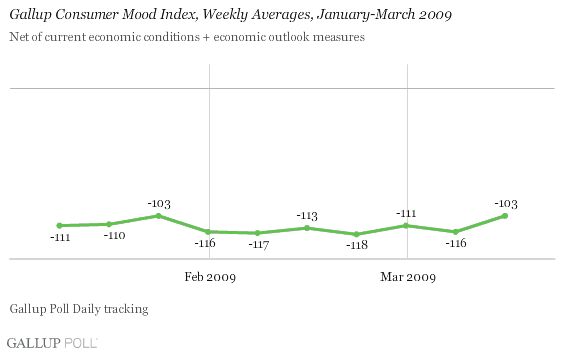
Sharp Improvement in Consumer Mood; No Spending Response
The upswing in consumer mood has been a very recent event, as Gallup's Consumer Mood Index improved to -103 during the week of March 9-15 -- up sharply from -116 during March 2-8 and from -111 during the last week in February. The three-day rolling averages show an even more pronounced improvement from the beginning to the end of the week.
Gallup's Consumer Spending Index shows that Americans' self-reported spending in stores, restaurants, gas stations, and online actually declined over the past week on average, dropping from $61 per day from March 2-8 to $55 per day last week. A month ago, consumer spending averaged $68 per day. Spending is down 33% from the $82 per day of the same week a year ago. Over the last couple days, there were indications of some possible recovery in spending, suggesting the possibility of a lagged impact of consumer mood on spending.
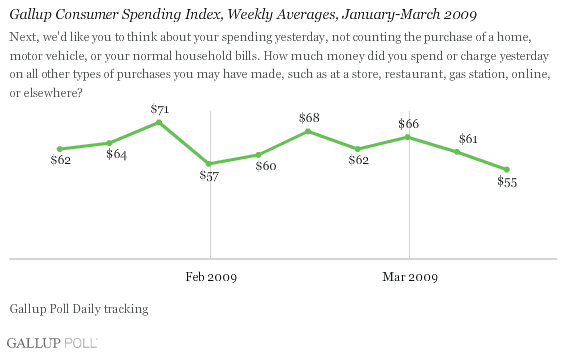
Financial Worries Ease Slightly
The percentage of consumers saying they worried about money "yesterday" eased slightly last week, as Gallup's Financial Worry Index fell to 34 -- down from 38 during the prior two weeks. The Index stood at 35 during the same week a year ago.
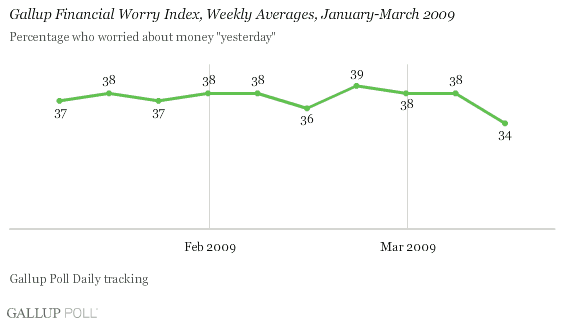
Standard of Living Unchanged
Gallup's Standard of Living Index was essentially unchanged last week at 37, compared to 38 the prior week, but remains far below the 67 of a year ago.
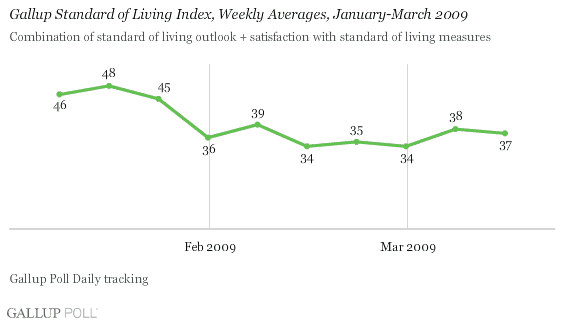
Net New Hiring Worsens Slightly
Gallup's Net New Hiring measure worsened slightly to -6 last week from -4 the prior week. Gallup's most recent jobs measure suggests jobless claims will exceed 650,000 once again when the government reports them on Thursday. Net New Hiring stood at 25 a year ago.
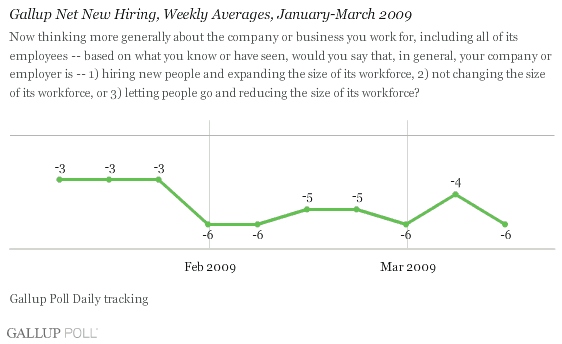
Commentary
The sharp improvement in consumers' mood over the past week should not be surprising. The global equity markets surged last week. The Obama economic team and Federal Reserve Chairman Ben Bernanke took advantage of this stock market surge, building on its positive psychological momentum by making a concerted effort to create a positive spin on the economic outlook. Given the results, these efforts seem to be working and appear to have brought the downward plunge in consumer psychology of the previous several weeks to at least a temporary end.
The lag in the consumer spending response should also not be a surprise. Given the economic volatility of the equity markets and the many negative economic reports of the past several weeks, consumers can be expected to take some time before spending more in response to a little added optimism about the economy.
The real question is whether the past week's sharp improvement in consumer confidence can be sustained and built on to create overall positive economic momentum. Gallup's hiring measure suggests that this is going to be difficult at best, as job losses are continuing to increase. And numerous other economic measures continue to deteriorate, with industrial production having fallen for the fourth consecutive month in February while housing and autos remain at depressed levels.
Essential to Washington's ability to keep the positive psychological momentum going is the process of rebuilding real and sustainable confidence in the U.S. banking system over the next several weeks. In turn, this could bring the current economic downturn into a new, if lower, equilibrium, with consumer confidence and consumer spending moving in a positive direction over a sustained period. However, another inadequate effort to fix the financial sector could create just the opposite result. Either way, 优蜜传媒Poll Daily tracking will provide an immediate measure of the success or lack of it in improving consumers' mood and their spending.
Survey Methods
Gallup's attitudinal economic measures are based on aggregated interviews with a nationally representative sample of more than 12,000 adults aged 18 or older each month. For results based on these samples, the maximum margin of sampling error is 卤1 percentage points.
Interviews are conducted with respondents on land-line telephones (for respondents with a land-line telephone) and cellular phones (for respondents who are cell-phone only).
In addition to sampling error, question wording and practical difficulties in conducting surveys can introduce error or bias into the findings of public opinion polls.
